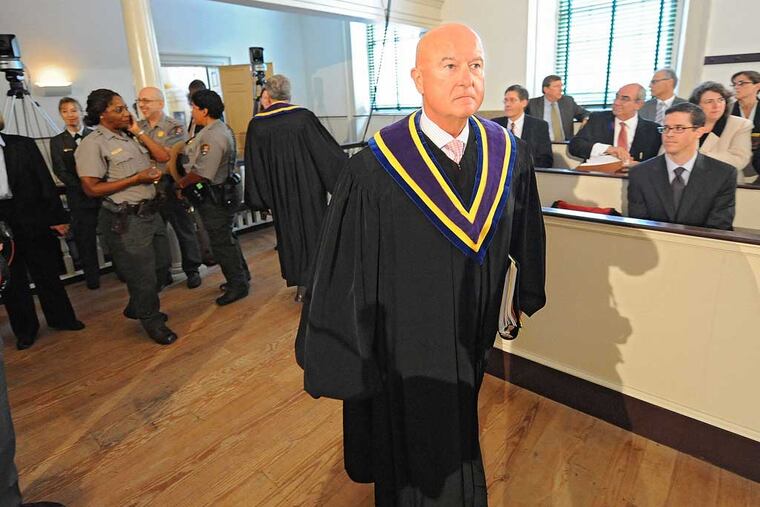Deal leaves court issues unresolved
When Pennsylvania Supreme Court Justice Seamus McCaffery submitted his resignation to Gov. Corbett on Monday, the sigh of relief among Pennsylvania officials was audible.

When Pennsylvania Supreme Court Justice Seamus McCaffery submitted his resignation to Gov. Corbett on Monday, the sigh of relief among Pennsylvania officials was audible.
In return for the resignation, the Judicial Conduct Board agreed to drop its investigation of McCaffery. Suddenly, it was not necessary to sort out the mess of countervailing allegations among the justices on the Pennsylvania Supreme Court. Bar Association leaders, law professors, and even editorial boards at leading newspapers, including The Inquirer, praised the resignation and urged the court to "move on."
But, far from ending the affair, the deal among the Judicial Conduct Board, the court, and McCaffery that led to the resignation further undermines the credibility and legitimacy of the court. The people of Pennsylvania will now never know whether McCaffery deserved the suspension that a bare four-justice majority meted out to him.
We have never seen these pornographic e-mails and we do not know whether an independent disciplinary body would have judged them worthy of removal from the court. We will never know whether the dark suggestions of criminal conduct against McCaffery had any basis. McCaffery has consistently denied all wrongdoing beyond a simple lapse of judgment and has claimed that Chief Justice Ron Castille, for reasons of personal enmity and to hide his own questionable conduct, orchestrated the suspension. We will never know the truth of that either.
Wouldn't a full investigation have been better?
Knowing the truth is not a matter of mere curiosity. If the chief justice really did unfairly hound McCaffery from office, he should himself face disciplinary action. And if McCaffery is guilty of half of what is alleged, he should lose his license to practice law.
Furthermore, the people of Pennsylvania have written into their constitution that misconduct by judges should lead to forfeiture of their pensions, which is admittedly a harsh penalty, but is the law. To put it bluntly, if McCaffery is guilty, why are we going to pay his pension? And if he is innocent, why are we going to pay his replacement?
And what was the hurry in resolving the matter? Was it embarrassment over the whole episode? Or was the real fear that, when all the facts were known, the court as an institution would be so tarnished that the people would demand judicial reform, perhaps even an appointed judiciary?
In addition to all this damage, the McCaffery resignation leaves in place, indeed even rewards, the transgressions of judicial authority that occurred during these events.
The investigation of McCaffery began with the chief justice threatening the attorney general - an independently elected executive branch officer - with disciplinary action if she did not transmit the e-mails to him. That violated the separation of powers.
The chief justice did not turn the e-mails over to the Judicial Conduct Board for an independent investigation, but publicly named McCaffery as the sole judge involved - inaccurately, as it turned out, since Justice Michael Eakin also received e-mails. Then, four justices voted to suspend McCaffery in an order that not only referred to the e-mails, but cited "media ... reports" of allegations that no prosecuting agency had ever credited, as well as threats against Eakin that McCaffery denied.
In addition, Justice Correale Stevens, who supplied the necessary fourth vote, has since hinted that he may run for an open seat on the court in November 2015. That race becomes easier with the vacancy his suspension vote helped bring about. He was appointed to the court after Melvin's resignation, and his current term expires in January 2016.
Once the suspension was in place, the court did not relinquish jurisdiction, as it had done in the previous suspensions of Justices Joan Orie Melvin and Rolf Larsen. Instead, claiming an ill-defined "King's Bench power," the justices retained ultimate authority over the case, despite the clear intention of the people of Pennsylvania, through a constitutional amendment, to remove the justices from any role in policing themselves. Thus, the judicial discipline system lost its independence.
McCaffery's resignation endorses all these actions, ratifying the lack of due process and the abuses of power. Though everyone is relieved, believing that the matter is over, the price we will pay for moving on is very high.